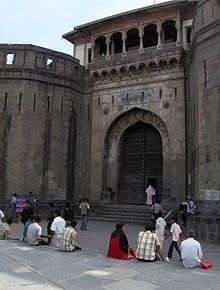Kasba Ganapati
The Kasba Ganapati refers to both a particular idol of the god Ganapati in Pune, India, as well as to the temple built around the idol. The Kasba Ganapati is the presiding deity (gramadevata) of Pune.
The temple was commissioned by Jijabai, after Dadoji Konddeo reported to her that an idol of Ganapati had been found in Pune. The idol's status as the premier idol in Pune was decided by Lokmanya Tilak.[1]
In the year 1630. The Maratha Aristocrat and wife of Shahaji Bhosale, Jijabai Bhosale arrived in Pune with her then infant son, Shivaji, the founder of Maratha Empire. Around this time, along with other seven families, the Thakar Family migrated to Pune from Indi, Vijapur District. Shri Vinayak Bhatt Thakar also carried his Family deity, Lord Gajanan along with him. All these families settled near River bank around the current place of Kasba Ganapati Temple which was close to the residence of Jijabai. Jijabai perceived this as an auspicious moment and promptly decided to build a temple, which is popularly known as the Kasba Ganpati Mandir.
Since then, Pune is also known as the city of Ganesh. The Peshwas were ardent followers of Lord Ganesh. During their regime Shaniwarwada witnessed grand celebrations for Lord Ganesh.
In 1893, Bal Gangadhar Tilak, the Indian Nationalist Leader, initiated the now famous Ganesh Festival. His intention was to gather people sharing similar ideas and exchange thoughts to deal with the British ruler. He started celebrating Ganesh Festival from his own house called Kesari Wada. Due to his personal popularity and initiative, Ganesh Festival became a public festival soon afterwards.
There was rivalry among the various mandals regarding the privilege of immersing the idol on the last day of the Ganpati festival. Bal Gangadhar Tilak resolved the rivalry and declared the privilege of immersion to Shri Kasba Ganpati, as it is the local deity of Pune.
Until 1925, Shri Kasba Ganpati Mandal celebrated the festival within the premises of the temple and from 1926 it has been celebrated in an enclosed mandap. Presently, the ten days of the festival is a platform for local artists to display their talents through various cultural programs thus allowing a large number of devotees to participate in the celebrations. On the last day, Shri Kasba Ganpati plays the leading role during the immersion procession.
References
- ↑ "Kasba Ganpati". Retrieved 10 April 2010.
